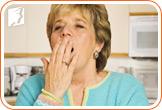If you can't bear the thought of waking up without your morning cup of coffee, you might have a problem.

No, it's not a problem with addiction (though coffee can cause that, too). The problem is the caffeine you're consuming may be causing or contributing to your chronic fatigue. It's easy to fall into the caffeine trap, especially during menopause. Keep reading to find out how your coffee or soda habit is wrecking your energy supply and what you can do to get it back on track.
How Caffeine Works

First things first: caffeine is a drug. While it may not be outlawed, this alkaloid derived from plants can have adverse effects on your body. Caffeine naturally puts your body in a state of stress because it signals to the adrenal glands to produce more adrenaline. It's this increased production of adrenaline that gives you an extra boost in the morning.
The Vicious Cycle

The boost only lasts for a few hours, however. After the adrenaline has worn off, you feel sluggish and tired, maybe even more than before. To fight the feeling, you might search for a coke, another cup of coffee, or chocolate to get the high again. Considering the consequences of that first cup of coffee or caffeine fix, it's easy to see how this becomes a vicious cycle.
It gets worse, though. All of this caffeine, even if you stop consuming it well before bedtime, can prevent you from sleeping at night. And the morning after a terrible night's sleep, you're more likely to reach for another cup of coffee to get you through the day.
Over long periods of time, caffeine consumption not only stresses your body, it stresses your adrenal glands. If they are constantly forced to produce elevated rates of adrenaline, they soon find that their stores are depleted. This causes you to drink more caffeine in search of that jolt of energy.
In addition, caffeine can cause stress and depression, which both increase the likelihood of fatigue.
How to Quit
Like any other drug, caffeine can have withdrawal effects, so it's best not to stop consuming it altogether. If you want to kick the habit, start by reducing your caffeine intake so that you don't suffer from headaches and irritability.

In place of your morning cup of coffee, eat a hearty breakfast so that you can get your energy from nutrients, not caffeine.
Remember to continue eating healthy all day. Have a nutritious snack, such as a piece of fruit or a handful of nuts to keep you going. And, of course, eat a balanced lunch to fight the need for a caffeine fix late in the afternoon.
More Information about Menopausal Fatigue
Chronic fatigue during menopause can affect you both mentally and physically, making it difficult to accomplish your daily goals.
Sources
- BMJ Group. "Menopause: What Is It?" Patient Leaflet. 2007.
- Hutchinson, Susan, M.D. "The Stages of a Woman's Life: Menstruation, Pregnancy, Nursing, Perimenopause, Menopause." November 2007.
- Love, Susan, M.D. Menopause and Hormone Book. New York: Three Rivers Press, 2003.



